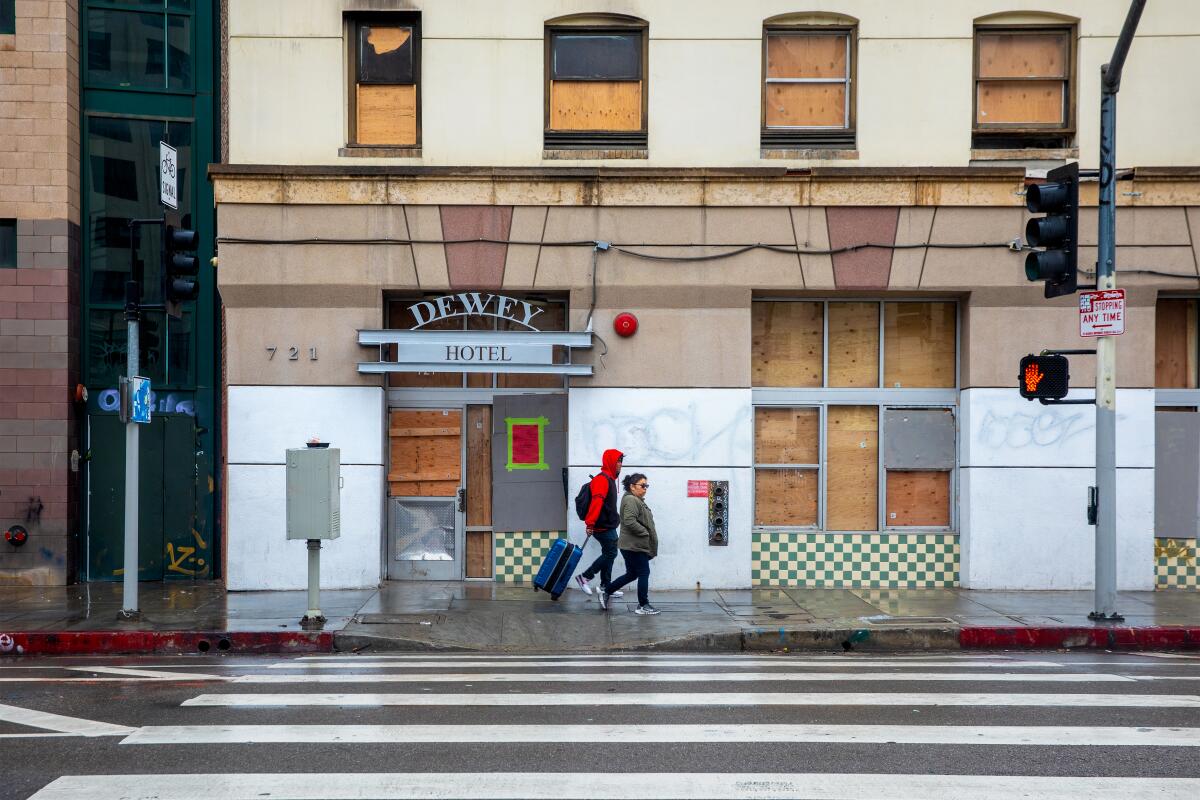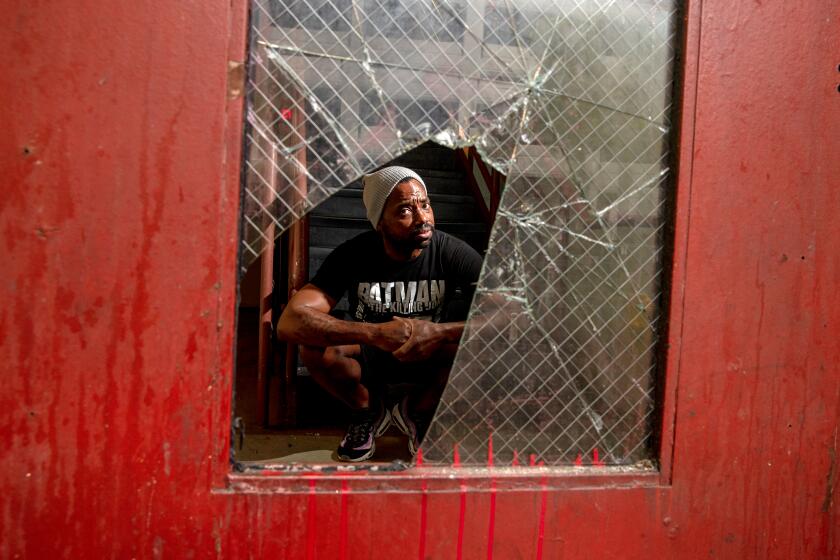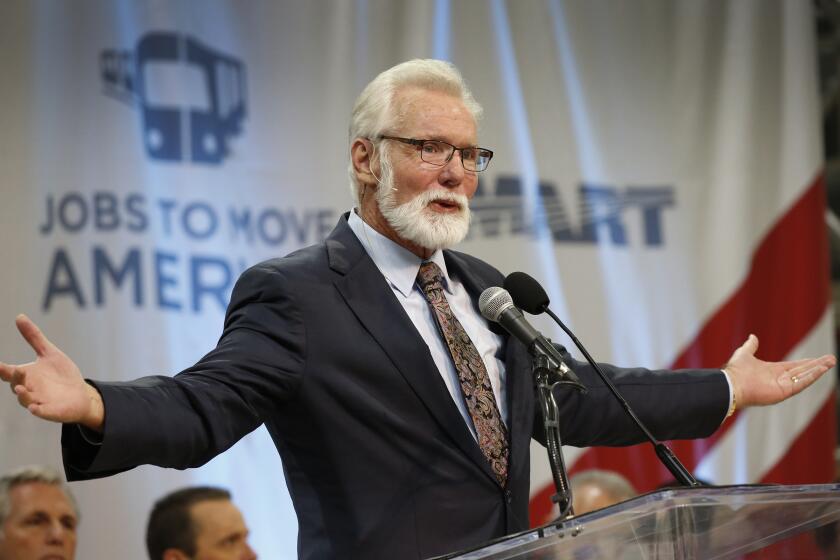L.A. seeks receivership for Skid Row Housing Trust’s 29 distressed buildings

- Share via
In a desperate move to reverse deteriorating conditions for more than 1,500 low-income tenants, the Los Angeles city attorney asked a judge Thursday to appoint a receiver for distressed residential buildings operated by the failing nonprofit Skid Row Housing Trust.
A petition filed in Los Angeles Superior Court proposes that the 29 buildings — many dating from the early 20th century, with others built since the 1990s — be turned over to a statewide receivership firm that specializes in court-ordered nuisance abatement.
The receivership plan came under attack even before the city filed its petition. Pacific Premier Bank, claiming the trust has defaulted on a $4-million loan, petitioned the same judge Wednesday for an order essentially putting it in control of the trust’s finances.
Judge Mitchell L. Beckloff, who was not in court Thursday, is scheduled to hear the competing cases Tuesday.
Citing uninhabitable and continually worsening conditions that the trust has no funds to address, the city’s petition asks the court to appoint Mark Adams, president of California Receivership Group, as receiver. His company specializes in court-ordered abatement of “nuisance conditions at slum properties, abandoned properties, and various types of dilapidated properties in California,” according its website.
“There are times — and this undoubtedly is one of them — when the extraordinary remedy entrusted to local governments ... is the only solution to an impending humanitarian crisis,” the city wrote in its petition. “The speed with which [the trust] imploded financially and functionally has created an immediate risk to the health and safety of the tenants and the general public, and demands a swift and all-encompassing response, including the appointment of a Public Health and Safety Receiver.”
The city sought an expedited decision due to the “the level at which residents are suffering due to these unlawful and dangerously substandard conditions. Time should not be wasted.” It comes after The Times revealed the depth of management and financial disarray at the trust, which festered for years before culminating in the meltdown of an institution that had long stood as a model for housing homeless people.
The Skid Row Housing Trust was a model for nonprofits housing homeless people in Los Angeles. Behind the scenes, it was imploding — leaving tenants in squalor.
The rescue plan relies on a seldom used provision in the state health and safety code that allows a court-appointed receiver to borrow against distressed properties to rehabilitate them.
Adams’ company advertises on its website that the procedure requires no public funds because the law gives the receiver priority over any other debt holders to collect revenues from the revitalized properties to pay off the loans.
However, city officials acknowledge that public funds will inevitably be required for the trust rescue because many of the trust’s buildings operate at a loss and have covenants restricting rent increases — and thus have no value to borrow against.
How much, and where those funds would come from, is unclear. In a news conference Thursday, Mayor Karen Bass and City Atty. Hydee Feldstein Soto detailed the deteriorating conditions within the buildings describing how in two instances the Los Angeles Fire Department was called to carry residents of one building down the stairs because the elevator broke.
Feldstein Soto also added that this was the biggest public safety receivership in the city’s history.
“Losing nearly 2,000 units of housing would be devastating to skid row and would be felt citywide,” Bass said Thursday.
“Undoubtedly people would lose their lives,” she said.
Last week, in a step to stabilize some of the trust’s most troubled buildings, City Councilwoman Nithya Raman introduced a motion to set aside $700,000 and authorize the Los Angeles Housing Department to engage a security firm. The motion has not yet been set for a committee hearing.
Los Angeles housing officials are planning to step in with immediate help to stabilize residential buildings that the financially strapped Skid Row Housing Trust is unable to maintain in habitable condition.
Adams has inspected all the buildings and has obtained a $500,000 line of credit to reestablish security and management at the properties and begin making repairs, Feldstein Soto said. He is expected to take over security at the buildings and retain a property management firm that could absorb the trust’s existing staff at the buildings, bring in its own staff as necessary or a combination of both.
Feldstein Soto said Adams will assess the needs of each building and report back on how much the work might cost.
“There are nine buildings that have fire orders against them. Those are the most dangerous conditions. They need immediate attention,” she said.
“We have a number of urgent repair orders, whether it’s the elevators or other dangerous conditions and leaky roofs. So our receiver is going to take care of things that are a threat to life and to limb before he takes care of the threat to property. “
The goal is for Adams to quickly transfer control of the newer and more stable buildings to nonprofits that have expressed interest in taking them over. Meanwhile, he would tackle the deeper problems in the remaining buildings that, in many cases, are up to half empty because of deferred maintenance that leaves units uninhabitable.
Investors who still have an interest in some of the buildings would be expected to participate in the costs. For about half the buildings whose initial investors have cashed out, the city and possibly the state would have to share in the costs, officials said.
The petition came two weeks after The Times published a story on deplorable conditions at one of the trust’s buildings, the Sanborn, and the trust sent a letter to the Los Angeles Housing Department complaining that “little external support has been provided despite repeated requests.”
The letter warned that “the Trust will be unable to operate the properties for much longer, furthering the safety and housing security of our residents.”
Notices posted March 27 at the trust’s buildings informing tenants of the receivership plan precipitated the response by Pacific Premier Bank, contending that the trust’s properties are collateral for its loan.
Pacific Premier is requesting a temporary restraining order prohibiting the transfer of the properties, freezing the trust’s bank account and giving the bank access to the trust’s buildings.
In a brief opposing the request, attorneys representing the trust argued that Pacific Premier Bank “shockingly doesn’t propose any provisions for the day-to-day operations of the Trust, and instead asks this Court to prioritize PPB’s financial interest over the health and well-being of 1,500 residents, the livelihood of 129 employees and public health, safety and welfare.”
The legal dispute has generated hundreds of pages of court filings, documenting dilapidated conditions inside many of the nonprofit’s buildings and giving an inside look at the trust’s upside-down finances.
In a declaration, interim Chief Executive Joanne Cordero said the trust “faces an approximate $300,000 monthly cash flow deficien[cy] against essential operational needs” and has $800,000 in payroll due April 4.
Cordero, who was appointed in fall, told The Times that she stopped paying Pacific Premier Bank in November because she could barely make payroll.
Given that the the loan counted toward the bank’s requirement under federal law to help meet the credit needs of its community, she found its conduct “shameful.”
“Their reckless and selfish legal action threatens the lives of 1,500-plus residents and the jobs of 129 staff,” she said.
More to Read
Sign up for Essential California
The most important California stories and recommendations in your inbox every morning.
You may occasionally receive promotional content from the Los Angeles Times.














